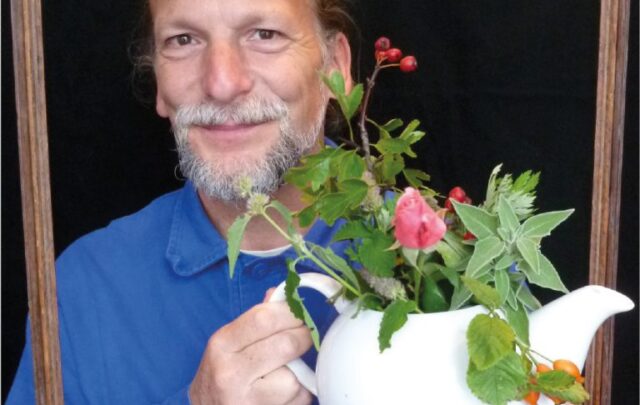
In an affluent neighborhood of Windhoek, two young men from the former township are selling organic produce. John and Immanuel Negongo are revolutionizing Namibian agriculture.
Every Saturday at an organic market in Klein Windhoek, two young men sit in front of a sign that reads Iyimati, their company name, which means “fruits of our labor”. Fresh lettuce, spinach and beans are laid out in front of them. “People who come here care a lot about organic farming,” says one of them, John Negongo. “They worry about all the chemicals that are used to treat produce sold at the supermarket.”
In colonial times, Klein Windhoek was one of the first locations where German colonial troops settled in modern-day Namibia. Many descendants of German settlers still live there today. The walls are tall and topped with razor wire. On Saturday mornings, stands like the one by lyimati are set up around Saint Stephen’s Church, selling produce, jewelry and fabrics. There is also a little café where German-Namibians, in particular, like to meet for breakfast. “The atmosphere here is very pleasant. We get to buy fresh produce and we know where it comes from”, says Lise Woensdregt, a young Dutchwoman who shops here every Saturday.
The farmer and his online class
Johannes “John” Negongo and his brother Immanuel are from Omege, a village in northern Namibia near Oshakati. “We grew up farming,” John explains. When John went to the city to go to college, he could not afford to buy enough food. “So I decided to start a garden at home and watched online classes about gardening.” In 2007, he began volunteering with the aid organization Family of Hope Services (FOHS). Four years later, he was in charge of the FOHS garden, where the initiative grows its own vegetables. They distribute meals to children whose parents cannot provide for them.
“When I first started with FOHS, I already knew a lot. So I just kept going, with passion and patience.” When the initiative moved in 2014, John and his brother Immanuel started a new garden at the new location. But since they wanted to maintain the old plot as well, the brothers continued to work the original garden to supply the FOHS soup kitchen. At the end of last year, when they realized that they produced more than the soup kitchen needed, they negotiated a deal with the organization that allowed them to sell 40 percent of the harvest from both gardens themselves. This is how they ended up with their own company: Iyimati.

The team: Maria Negongo (Sales), Johannes Negongo (Director), David Nekongo (Production Manager), and Immanuel Negongo (Sales Manager). Photo: Mesias Philipus
Pioneers amongst corrugated iron huts
About ten kilometers northwest of the Green Market is Hakahana, part of the former township Katutura, which means “the place where we don’t want to stay”. During apartheid, the city administration of Windhoek banished black families to the suburbs to create a “white city”. While living conditions today have improved in the former township, Hakahana mostly remains a disarray of corrugated iron huts, one of the poorest quarters of town. Travel directors advise tourists to only visit the quarter on guided tours.
John is sitting on a small bucket in a shirt and jacket, leafing through his business papers. Serenity reigns at the place where the partners grow their vegetables. Their greenhouse, constructed from poles and nets, is tucked away behind a small, pink medical station. Garlic, cilantro and many other plants are sprouting. “It can’t be that the whole world is practicing organic farming and we in Namibia don’t,” says Immanuel. For the two brothers are organic farmers. They forego chemical fertilizers and pesticides, and instead work with what nature offers them. A virtue born of necessity: When they came to Windhoek, they had to grow their produce in the most cost-effective manner possible – without any extras. As they did their research on how to accomplish this, they also discovered the importance of maintaining the eco-system.
In their home country, awareness for nutrition and organic foods is very slow to grow. “This means we will be Namibia’s pioneers,” John laughs. They started out with weekly net profits of 500 Namibian dollars (which is about 35 Euros), yet in the course of this year, they have attained weekly profits of 5,500 Namibian dollars. “We recently purchased another plot of land, and plan to make weekly profits of 30,000 dollars starting in March 2016,” John proudly declares.
Planting the future
Today, John and Immanuel are selling more than just vegetables. New business fields are emerging, slowly but surely: For example, they provide landscaping services to private clients in Windhoek. The brothers and their coworkers have already created six flower gardens and provide regular maintenance for three others. “Demand is growing steadily. Soon we’ll have more jobs than we can handle.”
Yet the organic farmers want more than to make a profit. They want to make a lasting impact on farming in their country. After a newspaper published an article about the brothers, the German Society for International Cooperation (giz) approached lyimati. “They suggested a cooperation to educate the people of Windhoek about organic farming. We are still lacking the funds to do it, though.” The curriculum would include biodiversity as well as ecosystem, environmental management, gardening and permaculture. “Because we want our children and grandchildren to be able to enjoy nature, as well,” John says, beaming.





